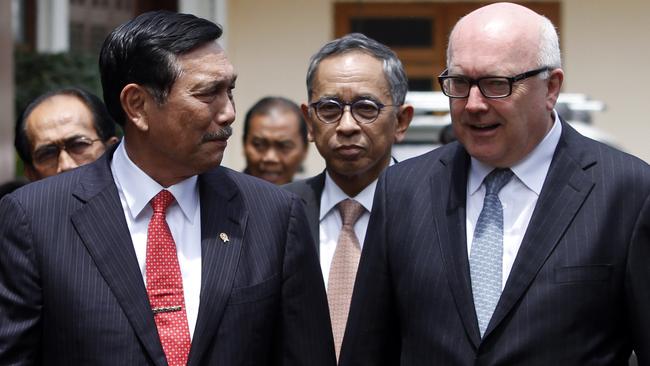Islamic State eyes Indonesia as base for ‘a distant caliphate’
Islamic State has identified Indonesia as a location for a ‘distant caliphate’, George Brandis warns.

Islamic State has identified Indonesia as a location for a “distant caliphate”, Attorney-General George Brandis has warned, stoking fears that the terror group may establish a beachhead for Islamist violence and extremism on Australia’s doorstep.
As Indonesian police yesterday revealed fresh details about an alleged cell of Islamic State-inspired militants arrested at the weekend, Australian authorities warned that the terror group was seeking to expand its influence across Indonesia in what would constitute a threat to Australian and Western interests.
Senator Brandis said there was “no doubt at all” that Indonesia had become an object of ambition for Islamic State, which has declared caliphates in Afghanistan, Libya and other countries outside Syria and northern Iraq.
“ISIS has ambitions to elevate its presence and level of activity in Indonesia, either directly or through surrogates,” Senator Brandis told The Australian.
“You’ve heard the expression the ‘distant caliphate’? ISIS has a declared intention to establish caliphates beyond the Middle East, provincial caliphates in effect. It has identified Indonesia as a location of its ambitions.”
The Australian has been told counter-terrorism authorities from at least one other Western country have warned that Indonesia could become for Australia what Belgium is to France: a foreign jurisdiction where Australia has no authority but where Islamist radicals operate freely, as the Paris attackers did in Belgium.
Senator Brandis’s stark warning followed a day of talks between Indonesian and Australian ministers, police chiefs and security officials, in which the threat of terrorism was the main focus.
The Jakarta meeting came as Australian and Indonesian foreign affairs and defence ministers met in Sydney and agreed on stronger co-operation to combat terrorism by sharing intelligence.
A “memorandum of understanding on combating international terrorism” and a renewed defence co-operation agreement were signed at a meeting of foreign affairs and defence ministers attended by Julie Bishop and Marise Payne and their counterparts, Retro Marsudi and Ryamizard Ryacudu.
In Jakarta, Justice Minister Michael Keenan said the rise of Islamic State had destabilised the security of both countries.
“The rise of ISIS in the Middle East is something that has destabilised the security of Australia, it’s destabilised the security of Indonesia and it’s destabilising the security of our friends and partners, particularly here in the region,” Mr Keenan said.
In the first annual meeting of the Council of Ministers in Jakarta, Australia and Indonesia agreed on a raft of measures aimed at boosting counter-terrorism co-operation between the countries.
They include a commitment to enhance co-operation in cyber crime, intelligence-sharing, technical co-operation and terrorism financing.
“(The) level of co-operation has been good, but it’s certainly the case that it can be improved,” Senator Brandis said.
Working groups will be created to implement the new measures.
Australian Federal Police commissioner Andrew Colvin and ASIO director-general Duncan Lewis also participated in the talks, underscoring their importance.
While there is almost no chance ISIS could establish a caliphate, or state, within Indonesia, Australian authorities are deeply worried the terror group may establish a permanent foothold in the archipelago, enabling it to conduct attacks against Western or Australian interests within Indonesia and beyond.
As grounds for their concern, they cite Indonesia’s poor border security, its large Muslim population, which includes a sizeable community of Islamic extremists, the faint hand of Indonesia’s police in remote parts of the country and the large number of JI militants due to be released from Indonesian prisons.
Indonesia has as many as 300 jihadis under arms with Islamic State although the estimates vary wildly as Jakarta does not accurately track the departure and arrival of its citizens. The Australian understands a number of them have returned home, further exacerbating the threat.
Yesterday, Indonesian authorities said a number of the nine alleged Islamic State-inspired militants arrested in terror raids over the weekend were former members of Jemaah Islamiah, the terror group responsible for the 2002 Bali attacks.
The men were arrested across central and west Java, allegedly with bomb-making materials and Islamic State-style flags in their possession. Indonesian police have alleged they were plotting an attack on New Year’s Eve.


